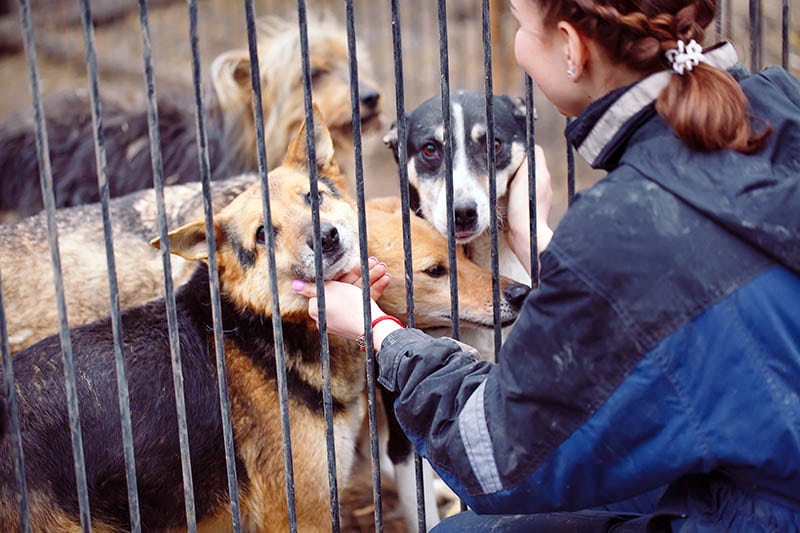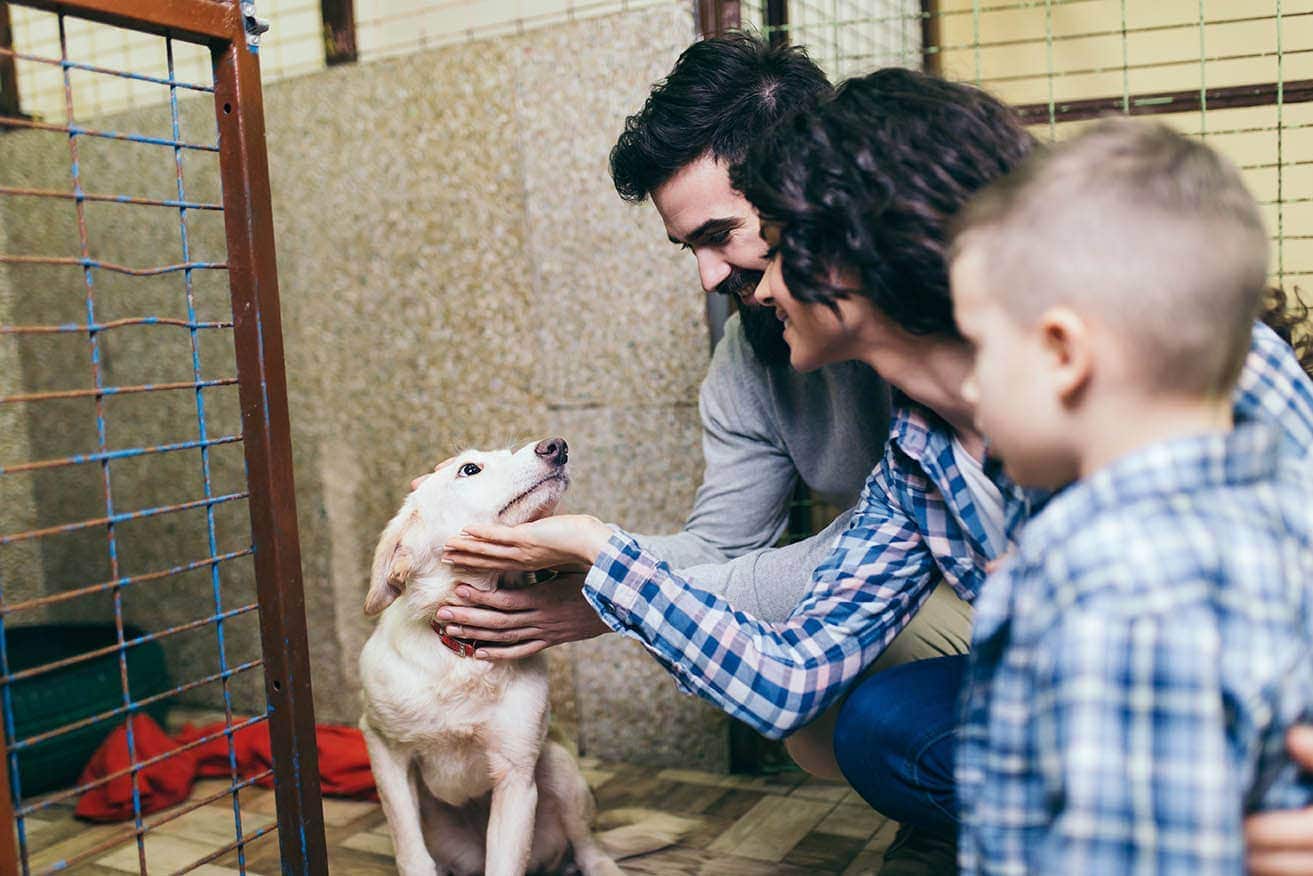15 Incredible Shelter Dogs Facts You Need to Know!

Updated on

Shelter dogs are amazing animals that deserve to find a loving home. They bring joy and companionship to their families, and they’re incredibly resilient creatures. Whether you’re looking to adopt a shelter dog or just want to learn more about these furry friends, here are 15 incredible facts you need to know!
The 15 Shelter Dogs Facts
1. Shelter dogs can come from a variety of backgrounds and breeds
There’s no one-size-fits-all description for shelter dogs; in fact, many of them are mixed breed! Mixed breed dogs often display a combination of traits from both parents, making them unique and special companions. Additionally, some shelter dogs may have been abandoned and picked up on the street, surrendered by their owners, or just got lost or ran away. Not all of them came from terrible environments before, but some of them did.

2. Adopting a shelter dog saves lives
According to the ASPCA, over 6 million animals enter shelters every year—and sadly, not all of them make it out alive. But when you adopt a shelter dog or cat, you save two lives: the pet who found their forever home and the new pet that can take their place in the shelter.
3. Shelter dogs are just as healthy as pet store puppies
Many people worry that shelter animals may not be as healthy as those found in pet stores. But this isn’t true—shelter dogs receive the same vaccinations and care that any other pup would get! In fact, many shelters even offer free health check-ups and make sure that your dog is healthy before sending it home with you.

4. Shelter dogs need time to adjust to their new homes
Like humans, shelter dogs can take time to get used to a new home and family. They may have had traumatic or difficult pasts, so it’s important to give them time and space to adjust before expecting too much from them. Additionally, crate training your pup can help make the transition easier since they may be used to living in tighter spaces and may feel more comfortable that way at first.
5. Shelter dogs are incredibly loyal
Shelter dogs have often been through a lot, so they’re grateful for the love and attention of their new families. This can turn into an incredibly loyal relationship—one that will last for many years to come!

6. Shelter dogs can be trained just like any other pet
Many people worry that shelter dogs may have behavioral issues or won’t respond to commands; however, with some patience and training, you can teach your pup good behavior just like any other dog. Additionally, many shelters offer free or inexpensive training classes to help get you started.
7. Shelter animals need exercise every day
Like any other pet, shelter dogs need regular exercise to stay healthy and happy. This could include a quick walk around the block or some fun playtime in the backyard. Whatever you choose, make sure your pup gets at least 30 minutes of exercise each day!

8. Shelter dogs can live long, healthy lives
Shelter animals are often just as healthy as their pet store counterparts—in fact, many of them live just as long! With proper care, your pup could easily be by your side for 10 years or more.
9. Shelters don’t always have purebreds available
Although there may be a few purebreds in shelters, most of the dogs are mixed breed. This doesn’t mean they’re not just as special—mixed breed dogs often have unique personalities and traits that make them perfect companions.

10. Shelter animals need extra love and care when they first arrive home
When you bring a shelter pet home, it’s important to take things slowly. Give your pup lots of cuddles and attention, but don’t overwhelm them with too much activity right away. Slowly introduce them to new people and experiences so that they can adjust to their new life without feeling overwhelmed or stressed out.
11. Shelters can provide valuable resources for pet parents
Many shelters offer free or discounted spay/neuter services, vaccinations, and other veterinary care. Additionally, many shelters have resources for training, behavior modification, and even pet supplies for owners that adopted their dogs from the shelter.

12. Shelter animals just want to be loved
At the end of the day, all shelter animals want is a loving family—and that’s exactly what you can give them when you adopt from a shelter! With patience and dedication, your new pup will soon become part of the family. And that’s something no pet store puppy can offer.
13. Adopting from a shelter makes a positive impact on the community
When you adopt from a shelter, you’re not only giving an animal in need a home—you’re also helping to reduce pet overpopulation and homelessness. Plus, your adoption fees help fund other programs that shelters offer to make their communities better for pets and people alike. So, by adopting rather than shopping, you can make the world a better place one pup at a time!

14. Shelters are great places to find a furry friend
No matter what kind of pet you’re looking for, you can likely find them in a shelter! From puppies and kittens to young adults and seniors, shelters have animals of all shapes and sizes just waiting for their forever homes. So, if you’re looking for your new best friend, don’t forget to take a look at your local animal shelter. You never know who you might meet!
15. Shelters are full of special needs animals too
Many shelters have special needs animals that need extra love and attention. These include pets with sight or hearing impairments, chronic medical conditions, or behavioral issues. Dogs with special needs may be less likely to be adopted. Although these animals may take more time and patience to care for, they often make amazing companions! So don’t forget to consider the special needs pets when you’re searching for your new furry friend.
FAQs About Shelter Animals
What should I expect when adopting a shelter animal?
When adopting a shelter pet, you can expect to meet and learn about the animal before making any commitment. Most shelters require potential adopters to fill out an application, provide references, and complete a home visit. Once your application is approved, you will be able to take your new pet home!

Are there different types of shelters?
Yes! There are many different kinds of shelters including municipal pounds, no-kill rescues, foster homes, and more. Depending on the type of shelter you adopt from, the adoption process may differ slightly. Be sure to research the shelter before applying so that you know what to expect.
What if I can’t afford to adopt a pet from a shelter?
Many shelters offer discounted or even free adoption fees for those who cannot afford the full cost. Additionally, many shelters have programs that provide other assistance such as supplies or veterinary care for adopters. Be sure to ask about any available resources when applying for adoption.
Do I need to prepare anything before adopting a pet?
Yes! Before taking your new pet home, be sure to have the necessary supplies on hand such as food, bedding, toys, and training materials. Additionally, some shelters may require adopters to provide proof of vaccinations or other veterinary care prior to adoption. Be sure to check with the shelter ahead of time so that you can be prepared when bringing your new furry friend home.

What resources do shelters offer for adopted animals?
Most shelters provide basic medical care such as spay/neuter surgeries and vaccinations as part of their adoption process. Additionally, many shelters offer low-cost or free additional services such as training classes and behavior workshops. Be sure to inquire about any available resources when adopting a pet from a shelter.
Are there any special considerations when adopting an older animal from a shelter?
Yes! While puppies and kittens are often the most popular animals in shelters, older pets can make great companions too! When adopting an older pet, you should consider their physical and mental health needs, as well as the amount of time you will be able to dedicate to them. Additionally, you should make sure that the animal is well-socialized and comfortable in your home before bringing it into your family.
Don’t Forget the Cats!
Although dogs usually get most of the attention when it comes to adoption, there are plenty of amazing cats in need of homes too! Cats make wonderful companions, so if you’re looking for a low-key pet, consider adopting a feline friend as well. You won’t regret it!
Final Thoughts
Adopting from a shelter is one of the most rewarding experiences you can have. By doing so, not only are you giving a loving home to an animal in need, but you’re also helping to fight pet overpopulation and save two lives: the pet who found their forever home and the new pet that can take their place in the shelter. So if you’re looking for a furry friend, consider visiting your local shelter—you just might find your perfect match!
Featured Image Credit: hedgehog94, Shutterstock










